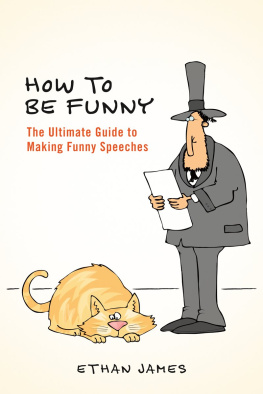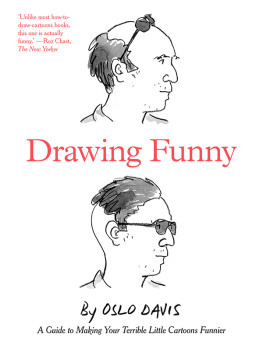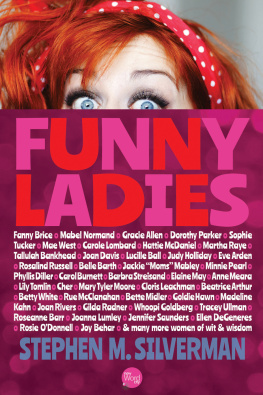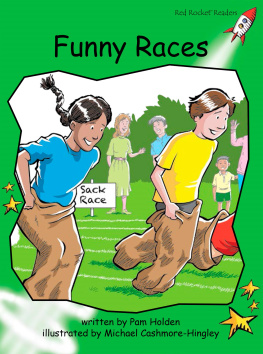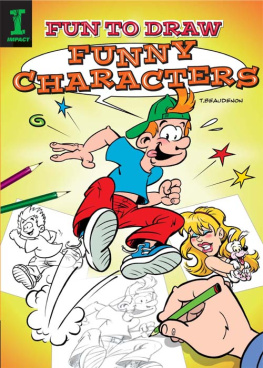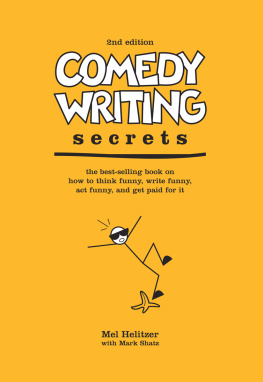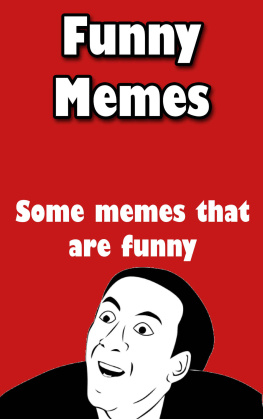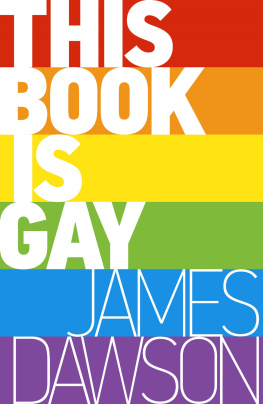Ethan James - How to Be Funny: The Ultimate Guide to Making Funny Speeches
Here you can read online Ethan James - How to Be Funny: The Ultimate Guide to Making Funny Speeches full text of the book (entire story) in english for free. Download pdf and epub, get meaning, cover and reviews about this ebook. year: 2001, publisher: BookBaby, genre: Romance novel. Description of the work, (preface) as well as reviews are available. Best literature library LitArk.com created for fans of good reading and offers a wide selection of genres:
Romance novel
Science fiction
Adventure
Detective
Science
History
Home and family
Prose
Art
Politics
Computer
Non-fiction
Religion
Business
Children
Humor
Choose a favorite category and find really read worthwhile books. Enjoy immersion in the world of imagination, feel the emotions of the characters or learn something new for yourself, make an fascinating discovery.
- Book:How to Be Funny: The Ultimate Guide to Making Funny Speeches
- Author:
- Publisher:BookBaby
- Genre:
- Year:2001
- Rating:4 / 5
- Favourites:Add to favourites
- Your mark:
- 80
- 1
- 2
- 3
- 4
- 5
How to Be Funny: The Ultimate Guide to Making Funny Speeches: summary, description and annotation
We offer to read an annotation, description, summary or preface (depends on what the author of the book "How to Be Funny: The Ultimate Guide to Making Funny Speeches" wrote himself). If you haven't found the necessary information about the book — write in the comments, we will try to find it.
Ethan James: author's other books
Who wrote How to Be Funny: The Ultimate Guide to Making Funny Speeches? Find out the surname, the name of the author of the book and a list of all author's works by series.
How to Be Funny: The Ultimate Guide to Making Funny Speeches — read online for free the complete book (whole text) full work
Below is the text of the book, divided by pages. System saving the place of the last page read, allows you to conveniently read the book "How to Be Funny: The Ultimate Guide to Making Funny Speeches" online for free, without having to search again every time where you left off. Put a bookmark, and you can go to the page where you finished reading at any time.
Font size:
Interval:
Bookmark:

HOW TO BE FUNNY
The Ultimate Guide to Making Funny Speeches
ISBN: 9781617927546
Ethan James
Dedication
This eBook is dedicated to all of those creative people who wish to make fascinating and entertaining speeches, but who are not quite sure how to go about doing so.
Contents
Introduction
Chapter 1: How to Be Funny
Chapter 2: Can I BE Funny?
Chapter 3: What Is Humor?
Chapter 4: Tension
Chapter 5: Get Animated
Chapter 6: How to Make an Audience Laugh
Chapter 7: The Event
Chapter 8: The Audience
Chapter 9: Decide on Your Persona
Chapter 10: Your Opening Joke
Chapter 11: Listen
Chapter 12: Keep It Short
Chapter 13: How to Write a Joke
Chapter 14: The Setup
Chapter 15: The Punch Line
Chapter 16: How to Write Funny Speeches
Chapter 17: Component 1 The Topic
Chapter 18: Component 2 The Outline
Chapter 19: Component 3 Developing Your Angle
Chapter 20: Component 4 Writing the Speech
Chapter 21: Component 5 Punch It Up
Chapter 22: Component 6: Rehearsing Your Speech
Chapter 23: Component 7 Giving Your Speech
Chapter 24: Body Language and Dramatic Pauses
Chapter 25: Actually Speaking to the Audience
Chapter 26: How to Win Your Audience Back
Chapter 27: A Sample Speech on Car Sales
Sample Speeches on Various Topics
101 Story Ideas
One-liners
Using Quotes
About the Author
INTRODUCTION
My idea for this eBook was conceived while watching the CFO of a Fortune 500 company give a speech at a stockholders meeting. Where is it written that finances have to be so boring a topic that yawning becomes the facial expression for most of the audience?
There could not have been enough oxygen in that hall to fully revive those unfortunate listeners. Since the companys finances were in rather good shape, why was it necessary to ponderously go through endless minutes discussing dozens of complicated ratios without a break?
What could have saved the mind-numbing day for the shareholders present was a bit of humor occasionally disbursed among all that dry verbiage.
In order to enhance future speech making for anyone charged with this daunting task, I have spent years studying humor and how to make it work best for presenters. Much of the time was consumed absorbing the techniques of stand-up comedians, renowned motivational speakers and doing a mammoth amount of reading. Then, I made numerous presentations and took to heart as well as analyzed what worked, what didnt and why.
After all that preparation, I am now very optimistic that you will benefit from what I have learned and will share with you in this eBook. Lets begin!
Chapter 1
HOW TO BE FUNNY
If two rabbis, a priest, and a monkey walk into a bar owned by a horse, but no one is there to see it, could you call this event humorous?
Since the days of Vaudeville, the answer would be, No. In fact, even if you were there to see it with your very own eyes, it probably wouldn't serve as humorous. Blame the political climate. Now, you see rabbis and priests together all the time, when it used to be that they never really hung out together. Furthermore, if you saw a monkey with them, you'd likely assume one of the men was somewhat disabled and that monkey was only there for assistance.
Honestly, if you saw a bar owned by a horse, would you be all that surprised? He probably got a deal as a minority owner; hence, his financing was lower, his regulations more lax, and his business would be a niche market in which investors could thrive. Who wouldn't want to dump a little money into the only cantina in town owned by a horse? The marketing campaign writes itself!
The point is that whatever makes us laugh has changed and not just recently, but over the course of human history. It has evolved along with human beings and the goings-on we have faced since we separated ourselves from the Neanderthals. Humor was there when mammoths walked the earth and women started poking fun at their men for being even hairier than the beasts.
It was alongside us when we were developing weapons, as the guys who had the bows and arrows kept teasing the guys who only had spears for getting trampled.
It was also there on the beach, when we were fourteen, and the bully was kicking sand in our face in front of the girl we loved.
Even though the topics that make us laugh have changed, the significance of laughter has not. It has always been - and will always be - a very deep, primal form of communication that alleviates anxiety and stress, shows acceptance of an individual by another individual, and an indicator of emotional investment into what a person is saying. Studies have shown that as a reliever of stress and a coping mechanism in times of duress, laughter is good for the mind, body, and soul. Even the most hardened and jaded human beings alive need a good laugh every once in a while.
In fact, the only thing people need more than laughter itself is the people who can make them laugh.
Mother Nature and everyday circumstances give us loads of funny fuel (how dogs meet and how swim suits one size too big are pulled off when someone jumps into a swimming pool come to mind), but the person every society needs is the person who can make its citizenry laugh. Thanks to all the economic uncertainty, wars, and famines across the globe, the individuals who possess the ability to make others smile will forever be in high demand. Why? It's simple: because people need to break free from their troubles, and laughter can do that.
Actually, laughter and music are great releases, but this isn't about how to play a guitar. It's about how to be funny.
Chapter 2
CAN I BE FUNNY?
Can you be funny? Now, thats a loaded question.
Interestingly enough, there is a pretty heated debate regarding whether a person is born funny or becomes funny. Some people believe that being funny is genetic, carried on a gene through generations much like skin or eye color. This school of thought believes that if your great-great-great-grandfather could spin a humorous yarn about conquering a poorly-equipped army, chances are you stand a better chance of getting people to laugh about your trip to the hair salon than the lady who lives down the hall.
Others think that being perceived as funny is a matter of conditioning, of one's upbringing conflicting with real events in his or her life of ideology colliding with actuality. An example would be a child growing up hearing that there's no such thing as The Boogeyman; but, then, one day, he sees The Boogeyman on his way to work, carrying a briefcase and sporting a tie (he looks very stylish, by the way). Now, people on this side of the Funny Fence believe that it is his interpretation of that moment that will determine whether or not he is indeed funny.
Who is right? You decide.
First off, let us take a look at behavior in general. For those of you for whom behavior may be too broad a term, for the sake of this argument, behavior means the guiding force which dictates the actions other people see us take.' From temper tantrums to whether or not we give back a dollar we find lying on the street, behavior is our thought process that determines what we do next.
Innate behaviors - those with which we are born - are unlearned, meaning that we can do them without being taught. A good example would be hunger forcing us to seek food or quickly pulling away from a heated object before we get burned. Searching for food when hungry would be classified as an instinct, as it includes more complex processes involving the whole body that help determine survival. Yanking one's hand away from a hot kettle would be considered an automatic, reflexive action where no thought is involved, and it includes only a part of the body. The stimulus (heat) sends a nerve impulse along the finger, through the hand and arm, and into the spinal column, where the nervous system screams, "Yowzer!"
Next pageFont size:
Interval:
Bookmark:
Similar books «How to Be Funny: The Ultimate Guide to Making Funny Speeches»
Look at similar books to How to Be Funny: The Ultimate Guide to Making Funny Speeches. We have selected literature similar in name and meaning in the hope of providing readers with more options to find new, interesting, not yet read works.
Discussion, reviews of the book How to Be Funny: The Ultimate Guide to Making Funny Speeches and just readers' own opinions. Leave your comments, write what you think about the work, its meaning or the main characters. Specify what exactly you liked and what you didn't like, and why you think so.

